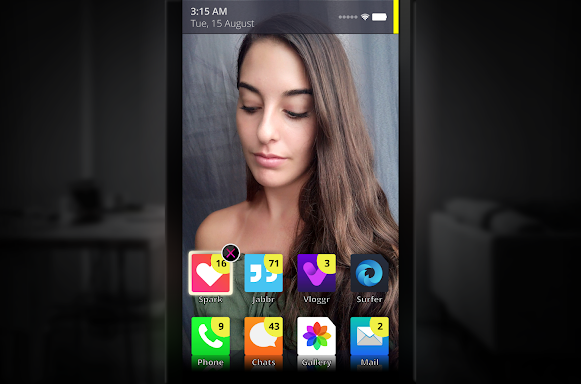Review by Lindsay M.
If you found a lost phone on the ground, what would you do? Would you pick it up? Would you actively try to find the owner, or passively wait for someone to ring it? Now what if that phone was left at your doorstop, and when you try to find its owner you learn she’s gone missing? That’s the basis of Simulacra, a found phone FMV title by Kaigan Games. It’s been out on mobile devices for a while now, but it has now made the jump to consoles.
Before even booting up the game, I have one main concern: the cell phone interface. I’ve played lost phone games before but always on my actual phone. Using a DualShock 4 controller to move around cell phone UI initially seems counterproductive. So I hold my breath as I start Simulacra, wondering if it will work out for the best.
Simulacra is a spiritual successor to Sarah Is Missing, where you find the phone of a girl who seems to have fallen in with a dangerous cult. This time around, the phone was left on your doorstep, so technically your apartment is the backdrop of the entire game. The phone is like any other cell phone, with apps and notifications and password-protected items. As you poke through it, you quickly learn it belongs to Anna, and Anna is missing. A lot of the game is spent interacting with two men who know Anna, although their intentions remain unknown so I remain suspicious of them both. In fact, every single character seems distrustful, but you’ll have to trust them for a chance at finding Anna.
I find myself enthralled with the mystery of Anna. What’s her deal? Who has she been in touch with? Is her disappearance job-related? Friend-related? Boyfriend-related? Did she meet the wrong person on social media? I need to know. But first, I must spend several hours playing detective.
Here’s the weird thing: despite dying to know what happened to Anna, I don’t find myself terribly attached to her personally. She could be any other random missing girl and it wouldn’t matter. She’s missing something to make her unique, to make her stand out among the throngs of other video game characters I’ve encountered this year. Perhaps what I’m trying to say is that as a character, she’s rather shallow.
Music, sound effects, and visual effects make for a spooky atmosphere. There were times when I legitimately started to feel like I was being watched, or not alone. And there were times when a terrifying visual effect legitimately made me jump. The sheer amount of audio, photographs, and videos leaves me a bit awestruck. I hate this word, but yes, the game is heavy on content. Anna’s entire life seems built into her phone, as it is for many of us in the real world.
The gameplay in Simulacra is relatively linear. Sometimes there are multiple goals, but you’ll always be solving one specific puzzle at a time to proceed with the narrative. There are multiple types of puzzles. When you’re not digging through information in various apps, you’re restoring sent texts/images. The text puzzles involve putting words together to form a complete sentence. For photos, you need to layer correct pieces to view the entire thing. You’ll also need to dig for personal information and use it appropriately. For the most part, there is no time limit on the puzzles. This means the player can learn and explore at their own rate.
At various points in the game, you’re able to restore more of Anna’s phone, allowing you access to new messages, photos, videos, etc. Of course, it’s rarely an easy task. Sometimes you need to direct people on the outside world to go places, other times there’s a puzzle to solve. And there’s one time where it just kind of did it itself.
The controls are easy to pick up, despite being attached to a digital cell phone. R2 allows you to respond with text (either pre-written or not), X is used to select, O to go back. You can scroll using either (or both) joysticks. It’s not the worst. There are times when the icons don’t convey what they stand for: R2 looks like a tiny tombstone, and the icon next to the triangle button is too small to decipher (it leads to Iris, the phone’s personal assistant).
Typing one word is fine. Typing more than that is a royal pain in the arse, and by the end of the game I outright dreaded the keyboard’s appearance. Worst yet, when there’s a time limit imposed it is downright impossible to type and solve the puzzles in the time allotted. Maybe the keyboard should be made available via Second Screen? But then I’d be on my cell phone, and I might as well play the game on my phone… it’s a slippery slope that again makes me question if a console is the best place for a found phone game.
The options begin and end with the ability to turn the subtitles off and on. I wish there were more subtitle options, specifically one for size.
Simulacra is one of the more interesting lost phone games I’ve played, and I enjoy the horror atmosphere it creates. The narrative is beyond intriguing despite the blandness of Anna herself, helped along by distrustful characters with more depth to them. I like the fact that there is generally no time limit, as it gives me time to sit and think, as well as to sift through the phone’s contents. The puzzles aren’t ridiculously difficult, but aren’t always easy either. I would like to return to the big question I’ve been asking all along: is it reasonable to play found game on a console with a controller? It works well enough, minus my gripes about small icons and the annoyance of typing text.
– Lindsay M.
News Editor










